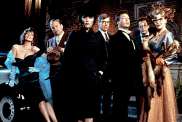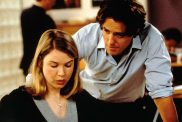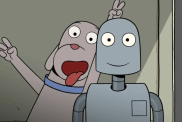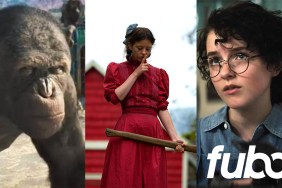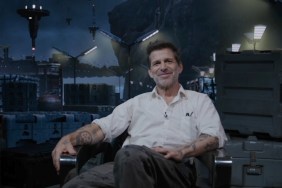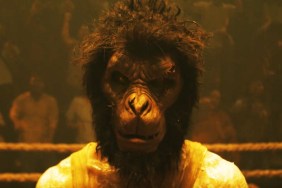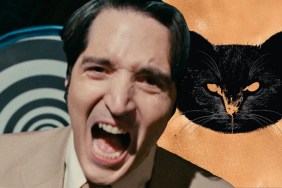Screenwriter Ehren Kruger has been the go-to guy in Hollywood for many years, very much a writers’ writer in terms of having scripts produced and knowing what might go over well with moviegoers. That was clearly the case with his 2002 J-horror remake The Ring and its 2005 sequel, which started the whole ball rolling on that particular remake trend, and his New Orleans based thriller The Skeleton Key also did decent business.
For his new action-thriller Blood and Chocolate, he takes on a new role, that of executive producer, which allowed him a bit more involvement with how the movie turned out. Based on the book by Annette Curtis Klause, it tells the story of Vivian, a young woman played by Agnes Bruckner, living in Romania with a group of outcasts who are actually “loup garou” or werewolves. That’s all fine until Vivian falls for a young human artist (Hugh Dancy), which causes friction within her family, especially the leader of the back, Gabriel, played by Olivier Martinez.
ComingSoon.net talked with Kruger about the film and his other upcoming projects.
ComingSoon.net: This is based on a book that I don’t know much about. As a producer, were you involved with acquiring the rights to make it into a movie?
Ehren Kruger: I was brought in afterwards; the project had been through a few writers before I got involved. The book was published essentially as a young adult novel, and in that market, was this very popular book. I hadn’t read it until getting involved with the movie project.
CS: As far as adapting it, did you work with the book’s author or get a chance to talk to her at all, and did you work from the previous scripts or start from scratch?
Kruger: There’s work in the movie that was done by Chris Landon and a previous writer, but when I came in, we did sort of take it in a direction that was a little different plot-wise than the source material. On this one, I didn’t work with Annette, the author, but we were very conscious of trying to maintain all of the themes of the book, everything that the character, this young woman Vivian, was going through. But in terms of the setting and the nuts and bolts of the plot, we did make some changes to try to make the story just a little more external than what in the novel is a pretty internal struggle.
CS: So the novel is more about Vivian and not so much about the other werewolves?
Kruger: Oh, it’s about her. It’s about the pack of werewolves, “loup garou,” that she’s enmeshed with, and the secret society that’s in hiding. That all is still there in the movie. The dramatic conflict of the novel is really this young woman coming to terms with this savage half of her nature, and this civilized half of her nature and what does she really choose? Just to make a more dramatic and visceral movie, we needed to make some changes to the plot of the novel, but the conflict for this character and for everyone in this secret society is really straight from the book.

CS: Did you have to research werewolf myths to incorporate into this script or did you want to try to do something fresh with the concept?
Kruger: The reason I got excited about this project, this book and the source material, was that it was really going back to the real ancient crux of the werewolf myth, which is a person who is literally half-wolf and when they transform, they transform into a real wolf. There was something about the reality of that dual nature that was exciting to us working on the project. It just felt like it had been a long time since we had seen that sort of duality expressed on screen. We’ve seen a lot of transformation sequences that involve guys in big suits and man-animal hybrids. What this source material really is addressing is the allure of someone’s primal or savage nature, as opposed to the more Universal Studios, the Wolfman lineage of werewolf mythology, which is that this is a curse, this is something to be overcome, this creates a monster. Annette’s book is really that it’s as much a blessing to be able access a more primal and primitive side of yourself as it is a curse.
CS: Of course, your production partners Lakeshore are known for the “Underworld” movies. Were you trying to get away from that and doing something different in terms of the love story?
Kruger: Yeah, well those are their movies, so they’re very conscious of not wanting to do the same thing again, and especially with the wolf effects and transformations, which is completely different than what they were doing with “Underworld.” What they did like in making those movies that they saw in this material was a real character conflict at the core story. In the middle of this supernatural thriller/horror structure to have a love story with a real dramatic conflict and emotional stakes for the characters driving everything. The guys at Lakeshore love genre projects, and they love exploring horror archetypes, but they are very conscious that we need to be doing it in different ways from picture to picture in bringing these things to the screen.
CS: Is this the first movie you’ve executive produced as well as written?
Kruger: This is the first thing I’ve worked on in a producer capacity to hit the screens, but I’ve been developing a number of things.
CS: How involved were you in the casting or the way the wolves transform in this movie, since you weren’t just writing the script and handing it over?
Kruger: In this situation, I had more input into talking about casting and design and talking about directors, and really talking about the nuts and bolts of how to get the picture budgeted and produced and made. A few more duties on this project, but I would have to say that I worked on some things as a writer where I’ve had to do some of those duties to. Sometimes as a writer, you’re on set, and sometimes you’re involved heavily in post-production, and sometimes they come to you and really want to know your thoughts on casting and sometimes they don’t. As a writer’s life goes, it all stems from the writer’s relationship with whoever is directing the picture. If the director feels like it’s a good relationship, then he or she often wants the writer involved and around, because at the end of the day, it is a director’s medium, first and foremost.
CS: In this case, it must have been different because you’re officially one of the producers as well as the writer, so did you actually spend more time on set for this or did you give Katja her space?
Kruger: This one I was actually having a child at the time of shooting, so I wasn’t over in Romania, but I was heavily involved all through prep up til then, and then came in for more input in post.
CS: You’ve written a lot of horror and genre movies, but you’ve always stuck with the PG-13 thing, when these days, a lot of horror these days is switching over to gorier R-rated scares. When people think of werewolf movies, they think of bodies being torn apart, but you stayed away from that. Can you talk about the benefits of working with a PG-13 rating and is that something conscious when you write?
Kruger: Well, it depends on the movie. I’ve worked on some movies that get put in the horror shelf on the video stores, but they’re really structurally like mysteries, and not so dependent on the gore factor, so they really don’t need to be R-rated movies. If the mystery is interesting and solid, the hardcore genre fans will go. Then if the story doesn’t demand that, then by going for a hard-R rating, you’re excluding some people who’d see the picture otherwise. In movies like “The Ring” or “Skeleton Key” or this one, it’s really not the blood and gore, that roller coaster experience that needs to be driving the story. There’s a bit more of a traditional mystery or thriller plot that’s the real engine for the movie. I’m not averse to high stakes terror or violence in movies or in the genre, by any means. It just happens that some of my projects that have been made haven’t required that in the same way.

CS: I think that I was one of the few fans of “Brothers Grimm.” I wondered how closely you worked with Terry Gilliam on that movie’s script? Were you privy to all the problems that movie suffered in production or was that more of a case of you writing the script and being done with it?
Kruger: I was involved with that one for quite a long time, and I did some drafts for Terry, and once it got into prep–Terry’s a writer, as you know–he went off to kind of polish the script, to make it a bit more “Gilliamesque.”
CS: I wondered if maybe you had to watch all of his old movies to get that sense of humor right in the script or whether it was something he added himself.
Kruger: Well, I would work with him. It wasn’t as quirky a screenplay in its original drafts; it was a little more straightforward. Once he became involved as the director, I would write drafts that tailored the story a bit more to his sensibilities and put a little more comedy and a few more off-kilter choices in. When he went into production and was doing the day-to-day on set, polishing the script, he would take it further in that direction.
CS: Youve adapted a few books, but was “The Ring” something that you went back to the original short story for or did you work from the Japanese film based on it?
Kruger: That one was really a strict adaptation of the movie. I didn’t read the “Ring” book until the movie had already come out.
CS: You sort of started the trend of remaking J-horror movies into English, because “The Ring” was the first movie of that nature which was really successful, and that started this domino effect. How do you feel about it looking back now? Do you think the trend has run its course because too many people looked to Japan for ideas rather than coming up with their own?
Kruger: I think that at the end of the day any trend has only so long a shelf-life. I personally think of all the movies you could remake in the J-horror cycle where it was really hot, I think “The Ring” is probably the best source material out there. It always speaks to the strength of what you’re working from. I think there are a couple other movies like “Audition” or “Cure” are also really fantastic, that level of source material. (And this is just my personal tastes speaking.)
CS: So you were a fan of Japanese horror beforehand.
Kruger: Yeah, I was a fan of that stuff beforehand, but I wouldn’t put some of the J-horror titles that have been remade in the same category as “The Ring.” I think some of it is a function of a trend running its course, and I think some of it is a function of there being only so much fresh source material to draw from, whether it’s Japan or Korea or France or Bollywood or anywhere. In any event, it both benefits you to be early to the trend and it benefits you to have a really strong source piece to work with.
CS: There’s been word recently of a “Rings” prequel, which is strange since DreamWorks is not really the same company. Have you heard anything about this and is it anything you’d want to be a part of?
Kruger: I doubt that I would be involved with it. I don’t know that I have too much more to bring to that world thematically, but never say never.
CS: It’s kind of interesting, because your movie created a different origin for the Samara character in some ways, so I wondered if you had more of that origin sketched-out that may be used in the prequel.
Kruger: One of the difficult things of making a horror sequel in general is because the horror genre is so founded on surprise. Whether it’s “The Ring” or “Alien” or “The Descent,” you’re experiencing a situation where you don’t know what the rules are or what’s going to happen. There is no pattern for you to start predicting, so it just makes it scarier. It’s very difficult to make any kind of horror sequel that doesn’t fall into a prescribed pattern or beats of the first.

CS: Even the Japanese sequels to “The Ring” and “The Grudge” weren’t very good.
Kruger: One of the great horror sequels is Jim Camerons “Aliens” and it’s because it’s not even a horror movie. It’s a totally different genre, its a war movie! One of the things when you’re making a horror sequel is you really have to try to upend expectations and try to do something totally different. Whatever we did in the first movie that worked, let’s not do that again. Try to do something way off-base that may not work, but at least it’s providing that feeling of surprise. Sometimes sequels do it, sometimes not, but it’s very hard to do. You look at franchises that really lend themselves to sequel treatment and they’re often adventure stories, the James Bonds and things, but horror is hard.
CS: How have things been going on “The Talisman”? Have you actually been working with Stephen King or Peter Straub on that at all?
Kruger: I haven’t worked with those guys, the authors. I’ve worked heavily with Steven Spielberg and Katherine Kennedy, who are the producers on the project, so we’ve had years of creative meetings on it. Now it’s moving ahead in a mini-series version, since we’re having trouble getting the feature off the ground. So I’m working on that now, and the good news about having six hours to tell the story instead of two is there’s a lot more of the book that can now be part of the movie.
CS: Did you have a script for a two-hour movie at one point that you’re embellishing with four more hours of story?
Kruger: We’re using some of the elements of the feature script and then, there’s a lot to add and expand. The core structure of the feature was always that of the novel, but there was just no way we could include a lot of what’s in the novel, so now we’re able to go back and cherry-pick the best sequences and plotlines and subplots of the novel again.
CS: Have you found a director for that and will it be the same director for the whole thing?
Kruger: I don’t know. Probably will be one director for the whole thing, but we’ll have more of a sense of that later in the spring.
CS: Any other scripts you’ve worked on that may be going into production soon?
Kruger: Well, I’ve got a couple other things that I’m working on, but I won’t really know ’til later in the year if they’re going to shoot. One’s a ghost story and one’s a crime thriller, so it’s still genre territory.
CS: You’ve been writing for such a long time. Do have any scripts that haven’t been produced that people are more interested in now that you’ve had a couple hits under your belt?
Kruger: You know, a lot of the early scripts, they’re in the drawer and they should stay in the drawer, but I’ve had good luck in the ten years I’ve been writing professionally, that a lot of what I’ve worked on has gotten made. I have a couple favorites I’m still fighting for, so we’ll see what happens with them.
Blood and Chocolate spills into theatres on January 26.
